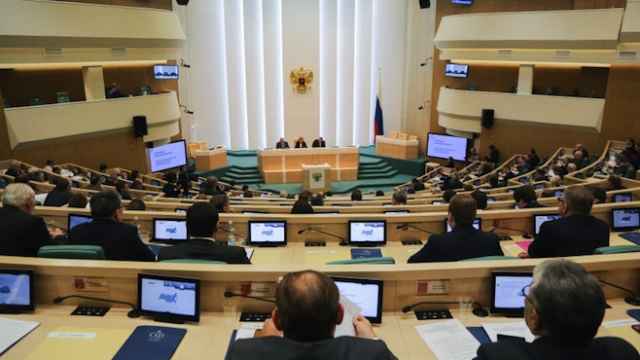Russia's new anti-terror legislation is set to cost mobile phone networks 10 trillion rubles ($154 billion), the RBC news website reported Friday.
The new laws require communications companies to store customers’ messages, including photos and videos, for six months. Internet companies will also face a fine of up to 1 million rubles ($15,700) for not decoding users’ data at the request of Russia’s Federal Security Service (FSB).
Earlier estimates had placed the predicted cost to operators at 2.2 trillion rubles ($34 billion), but the real cost is likely to be higher, data storage company RCNTEC's general director Denis Neshtun said.
The cost to companies could be reduced if the demands placed upon them were lessened, but companies would still need to pay a significant amount toward the system's upkeep, he told RBC.
Russia's mobile phone operators have estimated that by the time the law comes into force in 2018, they will collectively be forced to handle and record 107,142 gigabytes every second, the Kommersant newspaper reported.
Oleg Fomichev, the deputy minister for economic development, said in July that the kind of data storage infrastructure needed to implement the new anti-terror legislation “didn't exist anywhere in the world.”
It is “very difficult to say” what timescale would be needed to have the necessary infrastructure in place, Fomichev said.
Russia's biggest mobile operators have written to the government, arguing that the new demands would force companies to increase tariffs and pay less in taxes.
Author of the legislation, ultraconservative lawmaker Irina Yarovaya, called the claims a “baseless” excuse to raise prices.
The legislation was signed into law by President Vladimir Putin on July 7. The new laws include restrictions on religious activity, an increase in the number of crimes for which children aged 14-17 can be prosecuted and criminalizes a failure to report terrorist activities to the authorities.
A Message from The Moscow Times:
Dear readers,
We are facing unprecedented challenges. Russia's Prosecutor General's Office has designated The Moscow Times as an "undesirable" organization, criminalizing our work and putting our staff at risk of prosecution. This follows our earlier unjust labeling as a "foreign agent."
These actions are direct attempts to silence independent journalism in Russia. The authorities claim our work "discredits the decisions of the Russian leadership." We see things differently: we strive to provide accurate, unbiased reporting on Russia.
We, the journalists of The Moscow Times, refuse to be silenced. But to continue our work, we need your help.
Your support, no matter how small, makes a world of difference. If you can, please support us monthly starting from just $2. It's quick to set up, and every contribution makes a significant impact.
By supporting The Moscow Times, you're defending open, independent journalism in the face of repression. Thank you for standing with us.
Remind me later.





